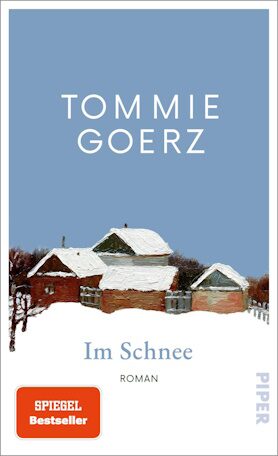Tommie Goerz
Im Schnee
[Snowfall]
- Piper Verlag
- Munich 2025
- ISBN 978-3-492-07348-6
- 176 Pages
- Publisher’s contact details
For this title we provide support for translation into the Polish language (2025 - 2027).
Sample translations
The House by the Railway Line
The novel opens with an image that feels like a still-life. Max, an old man, stands at the window of his small house, looking out at the apple trees. Snow has begun to fall, and he gazes into a quiet, softened world. Then a sound breaks through:
‘Gradually, through the silence, the tolling of the death bell had penetrated, very faintly at first, that dingdingdingding echoing from the church tower as if from a great distance. Max
hadn't noticed it at first, and when he finally did, it seemed as if it had always been there. Amidst the falling snow, amidst the white caps on the fence, amidst all this serene whiteness.’
It’s Schorsch who has died, Max’s best friend since childhood and perhaps something more than that. Max never married. The novel doesn’t spell it out, nor does it need to.
The village is divided. Goerz never uses words like ‘structural change’; he shows what it looks like. There’s a new housing estate, whose residents stay apart from the locals. Max lives in a place nicknamed ‘Platform Three’, as it is so close to the old rail line that once carried timber away from the village. Now and then, a train still comes by, sometimes dropping off the odd tourist in search of a wholesome rural life that no longer exists. The baker and the butcher are long gone.
Schorsch is gone too. And what do the old folk do when one of their own dies? They gather at night, keep vigil, and tell stories. Through those stories, a kind of unofficial village chronicle emerges; old feuds, old customs, and the ways the place used to work. In an interview, Goerz recalled that he was born in Erlangen, but at the age of ten, in the mid-1960s, he moved with his parents to the countryside. It felt like a kind of freedom, he said, because he was allowed to speak in dialect. He’s close to his characters because he knows what lives inside them. There’s no mockery, no cheap critique.
The tone is exactly right. A quiet story, shaded with melancholy, but laced with dry humour. Goerz writes in a clean, unsentimental style, never florid, never overwritten, and in just under 200 pages conjures up a vivid portrait of this world. It is a self-contained social ecosystem and at its centre is a quietly remarkable man who doesn’t see himself that way. He knows little beyond the life he’s had and the landscapes he has lived in. He has his memories and his knowledge. That’s more than enough for a truly moving novel.
Translated by Alexandra Roesch

By Christoph Schröder
Christoph Schröder, born 1973, lives and works as a freelance author and reviewer in Frankfurt am Main. Among others, he writes for ZEIT, Deutschlandfunk and SWR Culture.
Publisher's Summary
In a small village, where time has stood still for the last few decades, one of the old villagers, Schorsch has died. As tradition demands the villagers have come together for his wake, among them Max, Schorsch’s best friend.
Until midnight, the men sit with the deceased and drink, and then the women take over with songs and prayers until daybreak. Stories are remembered and retold, some bitter, some sweet, and together they paint a picture not just of the dead man but also of the soul of the village and the beauty and harshness of rural life. Max also takes part in the second half of the night. The women accept him because he is different from the other men, and always has been.
On the day of Schorsch’s funeral, new snow has been falling. As everybody gathers in the town church, people notice that Max is missing. They go looking for him, but he is nowhere to be found…
A perfect, slender gem of a novel, Tommie Goerz’ SNOWFALL combines the beauty of Robert Seethaler’s A WHOLE LIFE with the simplicity of Claire Keegan’s SMALL THINGS LIKE THESE and the elegiac tone of Max Porter’s GRIEF IS THE THING WITH FEATHERS.
(Text: Piper Verlag)
